Can Cats Have Yogurt? Safety, Benefits, and Expert Tips
As cat owners, we often wonder if sharing our favorite foods with our feline friends is safe. When you’re enjoying a cup of creamy yogurt and notice your cat’s curious eyes watching your every spoonful, you might ask yourself: can cats have yogurt? It’s a common question with a nuanced answer. While yogurt isn’t toxic to cats, there are important considerations regarding lactose intolerance, additives, and portion sizes that every responsible pet parent should understand before sharing this dairy treat.
In this comprehensive guide, we’ll explore the safety of yogurt for cats, potential health benefits, risks to watch for, and expert recommendations to help you make informed decisions about your cat’s diet.
Table of Contents
Is Yogurt Safe for Cats? Understanding the Basics
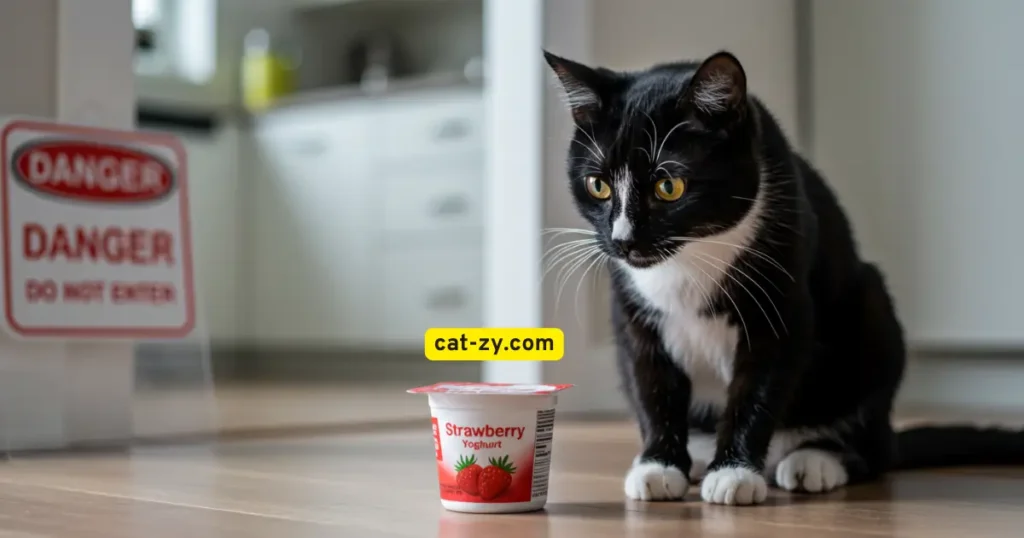
The short answer is that cats can have yogurt in small amounts, but it’s not suitable for all cats and should only be given occasionally as a treat. To understand why, we need to look at how cats process dairy products.
Lactose Intolerance in Cats: Why Most Cats Can’t Digest Dairy
Most adult cats are lactose intolerant. While kittens produce lactase, the enzyme needed to break down lactose (milk sugar), they typically lose this ability after weaning. Without sufficient lactase, cats cannot properly digest lactose, which can lead to digestive upset.
Dr. Sarah Miller, a veterinary nutritionist, explains: “As cats mature, their bodies produce less lactase enzyme. By adulthood, many cats don’t produce enough lactase to properly digest dairy products, making them lactose intolerant.”
Yogurt does contain less lactose than milk because the fermentation process breaks down some of the lactose. This makes yogurt somewhat easier for cats to digest than other dairy products, but many cats will still experience digestive issues.
Plain vs. Flavored Yogurt: What’s Safe for Cats?
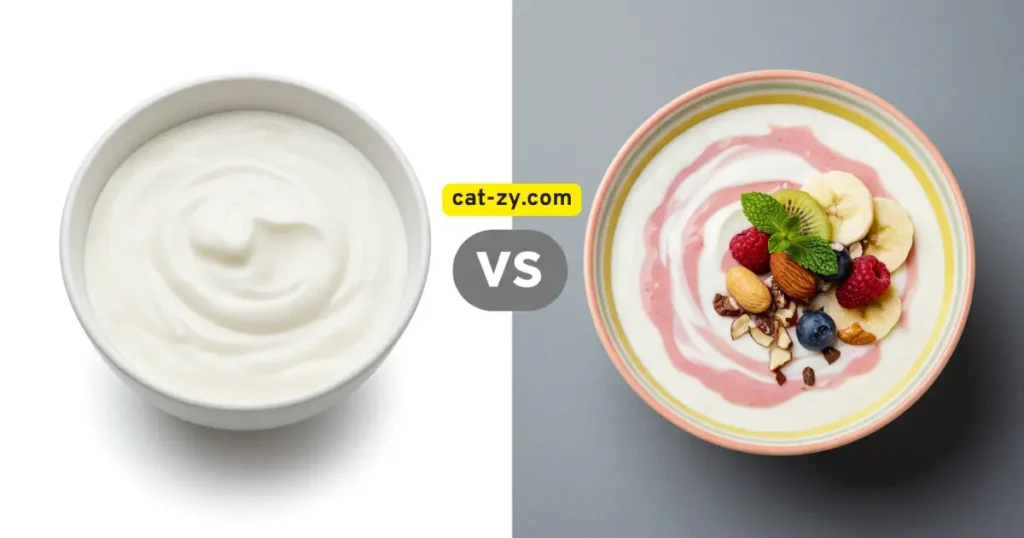
If you decide to offer yogurt to your cat, the type matters significantly:
Safe Yogurt Options
- Plain, unsweetened yogurt
- Greek yogurt (higher protein, lower lactose)
- Unflavored yogurt without additives
- Dairy-free yogurt alternatives (without xylitol)
Unsafe Yogurt Types
- Yogurt with added sugar
- Artificially sweetened yogurt (especially with xylitol)
- Flavored yogurts with fruits or vanilla
- Yogurt with chocolate, nuts, or granola
Warning about xylitol: This artificial sweetener is extremely toxic to dogs and potentially harmful to cats. Always check ingredients carefully, especially in “sugar-free” products.
Potential Nutritional Benefits of Yogurt for Cats
While yogurt shouldn’t be a dietary staple for cats, it does contain some nutrients that could potentially benefit your feline friend when given in moderation:

Probiotics: Supporting Digestive Health
Yogurt contains live cultures of beneficial bacteria that may support gut health. These probiotics can potentially help maintain a healthy balance of bacteria in your cat’s digestive system.
Veterinarian Dr. James Cooper notes: “The probiotics in yogurt may help some cats with minor digestive issues, but specialized pet probiotics are generally more effective for addressing specific feline gut health concerns.”
Protein Content: Essential for Cats
Cats are obligate carnivores that require high-quality protein. Greek yogurt in particular contains a good amount of protein, though it’s not a substitute for the animal-based proteins cats need in their primary diet.
Calcium and Other Nutrients
Yogurt provides calcium, which supports bone health, along with B vitamins and other nutrients. However, a complete and balanced cat food already provides these nutrients in appropriate amounts for your cat’s needs.
Key Takeaway: While yogurt contains beneficial nutrients, cats should get the majority of their nutrition from high-quality cat food specifically formulated for their unique dietary needs.
Potential Risks of Feeding Yogurt to Cats
Digestive Upset from Lactose Intolerance
The most common risk of feeding yogurt to cats is digestive upset due to lactose intolerance. Symptoms may include:
- Vomiting
- Diarrhea
- Abdominal discomfort and bloating
- Gas
- Lethargy
If your cat shows any of these symptoms after consuming yogurt, they likely cannot tolerate lactose and should avoid dairy products entirely.
Caloric Content and Weight Management
Yogurt contains calories that can contribute to weight gain if given frequently. Obesity is a serious health concern for cats that can lead to diabetes, joint problems, and reduced lifespan.
Harmful Additives and Ingredients
Many commercial yogurts contain ingredients that can be harmful to cats:
Potentially Harmful Ingredients in Yogurt:
- Xylitol: This artificial sweetener is toxic to pets and can cause liver failure.
- Added sugars: Can contribute to obesity and diabetes.
- Chocolate: Toxic to cats and sometimes found in flavored yogurts.
- Fruits like grapes and raisins: Toxic to cats and sometimes added to yogurt.
Dietary Imbalance
Cats have specific nutritional requirements as obligate carnivores. Feeding too many treats like yogurt can displace proper nutrition from their regular diet, potentially leading to nutritional imbalances over time.
How to Feed Yogurt to Cats Safely
Recommended Portion Sizes
If your cat tolerates yogurt well, follow these guidelines:
- First-time trial: Start with just ½ teaspoon to test tolerance
- Maximum serving: No more than 1 teaspoon of yogurt occasionally (1-2 times per week)
- Treat rule: Yogurt and all treats combined should make up no more than 10% of your cat’s daily caloric intake
Choosing the Right Yogurt for Your Cat
When selecting yogurt for your cat, follow these guidelines:
Best Yogurt Choices for Cats:
- Plain, unsweetened yogurt with no additives
- Greek yogurt (higher protein, lower lactose)
- Yogurt with live and active cultures (for probiotic benefits)
- Organic options to avoid pesticide residues
Introducing Yogurt to Your Cat’s Diet
Follow these steps when introducing yogurt to your cat:
- Start with a tiny amount (½ teaspoon or less)
- Monitor your cat for 24-48 hours for any signs of digestive upset
- If no adverse reactions occur, you can occasionally offer small amounts
- Always serve yogurt at room temperature
- Discontinue immediately if any negative symptoms appear
Want Expert Guidance on Your Cat’s Diet?
Get our free “Complete Guide to Cat Nutrition” and learn how to make the best dietary choices for your feline friend. Includes expert tips, food safety information, and personalized recommendations.
Cat-Safe Alternatives to Yogurt
If you’re interested in the potential probiotic benefits of yogurt but concerned about lactose intolerance, consider these cat-friendly alternatives:
Specialized Feline Probiotics
Veterinary-formulated probiotic supplements designed specifically for cats are more effective than yogurt for supporting digestive health. These products contain strains of beneficial bacteria selected for feline digestive systems.
Probiotic-Enhanced Cat Foods
Some premium cat foods now include probiotics in their formulations. These provide digestive benefits without the risks associated with dairy products.
Cat-Safe Treats with Digestive Benefits
Look for commercially available cat treats formulated to support digestive health without containing lactose or other potentially problematic ingredients.
Recommended Feline Probiotic Options
If you’re looking for ways to support your cat’s digestive health, these veterinarian-recommended options are safer and more effective than yogurt:
- Specialized feline probiotic supplements (powder or capsule form)
- Digestive support treats formulated specifically for cats
- Probiotic-enhanced wet or dry cat foods
What Veterinarians Say About Cats and Yogurt
“While yogurt isn’t toxic to cats, it’s not a necessary part of their diet. If you want to offer it as an occasional treat, stick to plain, unsweetened varieties in very small amounts. Watch for any signs of digestive upset, as most adult cats are lactose intolerant to some degree.”
— Dr. Elizabeth Morgan, DVM, Feline Nutrition Specialist
Most veterinarians agree on several key points regarding cats and yogurt:
Expert Consensus on Cats and Yogurt
- Not nutritionally necessary: Cats don’t require yogurt in their diet
- Occasional treat only: If given, yogurt should be an occasional treat, not a regular food item
- Individual tolerance varies: Some cats handle small amounts of yogurt well, while others experience digestive upset
- Better alternatives exist: For digestive support, veterinary-formulated probiotics are more effective
- Always consult your vet: Before adding any new food to your cat’s diet, especially if they have existing health conditions
“If your goal is to support your cat’s digestive health, there are better options than yogurt. Specialized feline probiotics contain bacterial strains selected specifically for cats and don’t come with the potential downsides of dairy products.”
— Dr. Michael Chen, Veterinary Gastroenterologist
Conclusion: Can Cats Have Yogurt?
So, can cats have yogurt? The answer is a qualified yes – some cats can have small amounts of plain, unsweetened yogurt occasionally without issues. However, it’s not appropriate for all cats, particularly those with pronounced lactose intolerance or other digestive sensitivities.
Key Takeaways:
- Most adult cats are lactose intolerant to some degree
- Plain, unsweetened yogurt is the only safe option
- Start with tiny amounts (½ teaspoon) to test tolerance
- Watch for digestive upset and discontinue if symptoms occur
- Yogurt should only be an occasional treat, not a regular part of diet
- Specialized feline probiotics are more effective for digestive support
- Always consult your veterinarian before introducing new foods
Remember that cats are obligate carnivores with specific nutritional needs best met through a balanced diet of high-quality cat food. While small amounts of yogurt may be a safe occasional treat for some cats, it’s not a necessary addition to their diet.
When in doubt about any aspect of your cat’s nutrition, consult with your veterinarian for personalized advice based on your cat’s specific health status, age, and dietary needs.
Keep Your Cat Healthy & Happy
Subscribe to our monthly newsletter for expert tips on cat nutrition, health, and behavior from veterinary professionals. Email Address Get Cat Nutrition Updates
Frequently Asked Questions About Cats and Yogurt
Is Greek yogurt safe for cats?
Greek yogurt is generally a better option than regular yogurt for cats who can tolerate dairy, as it contains less lactose and more protein. However, it should still only be given in small amounts (½-1 teaspoon) and must be plain with no added sweeteners or flavors.
Can kittens have yogurt?
It’s not recommended to give yogurt to kittens. While kittens produce more lactase than adult cats, their digestive systems are still developing and sensitive. Kittens need specific nutrition from their mother’s milk or kitten formula, followed by high-quality kitten food. Introducing yogurt could cause digestive upset and displace essential nutrients from their diet.
What about yogurt-covered treats for cats?
Yogurt-covered treats marketed for pets typically contain yogurt powder, sugar, and other additives that aren’t beneficial for cats. These treats are generally high in sugar and should be avoided. Opt for specially formulated cat treats instead.
Can yogurt help with my cat’s diarrhea?
While yogurt contains probiotics that might theoretically help with mild digestive issues, it’s not recommended as a treatment for diarrhea in cats. In fact, the lactose in yogurt could potentially worsen diarrhea in lactose-intolerant cats. If your cat has diarrhea, consult your veterinarian instead of trying home remedies. They may recommend specific feline-appropriate probiotics if needed.
Are dairy-free yogurt alternatives safe for cats?
Plant-based yogurt alternatives (like coconut, almond, or soy yogurt) avoid the lactose issue but may contain other ingredients that aren’t ideal for cats. If considering these options, ensure they contain no xylitol, added sugars, or artificial sweeteners. However, these products offer little nutritional benefit to cats and aren’t necessary in their diet.
How can I tell if my cat is lactose intolerant?
Signs of lactose intolerance in cats typically appear within 8-12 hours of consuming dairy and may include vomiting, diarrhea, gas, bloating, abdominal discomfort, and reduced appetite. If you notice these symptoms after giving your cat yogurt or other dairy products, they likely have some degree of lactose intolerance and should avoid dairy completely.

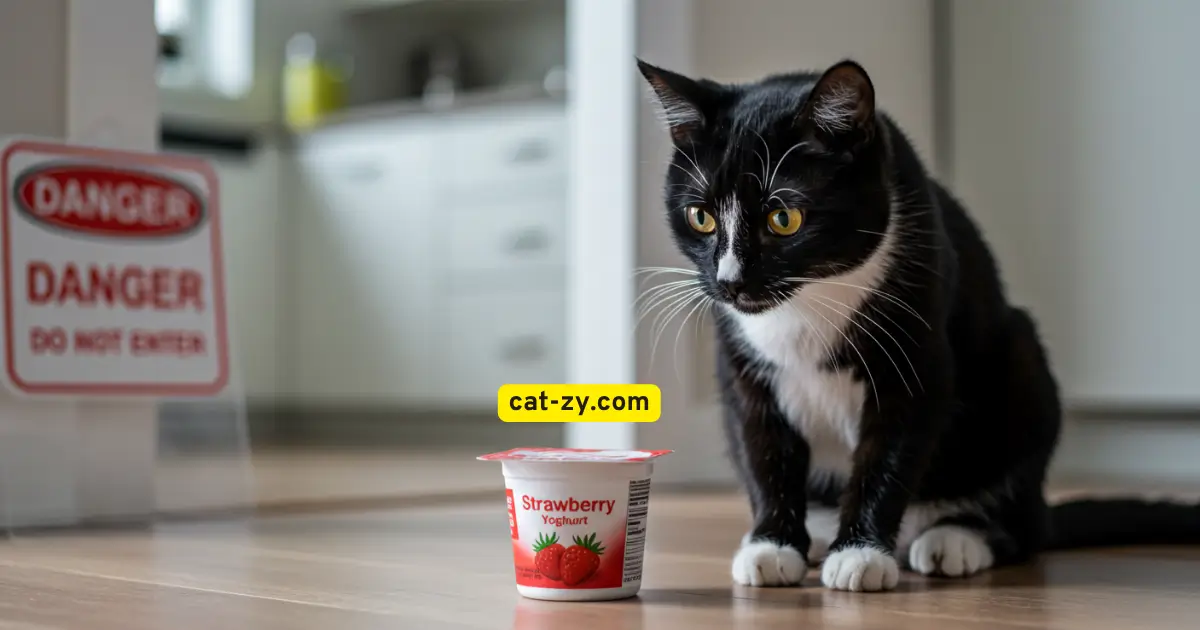
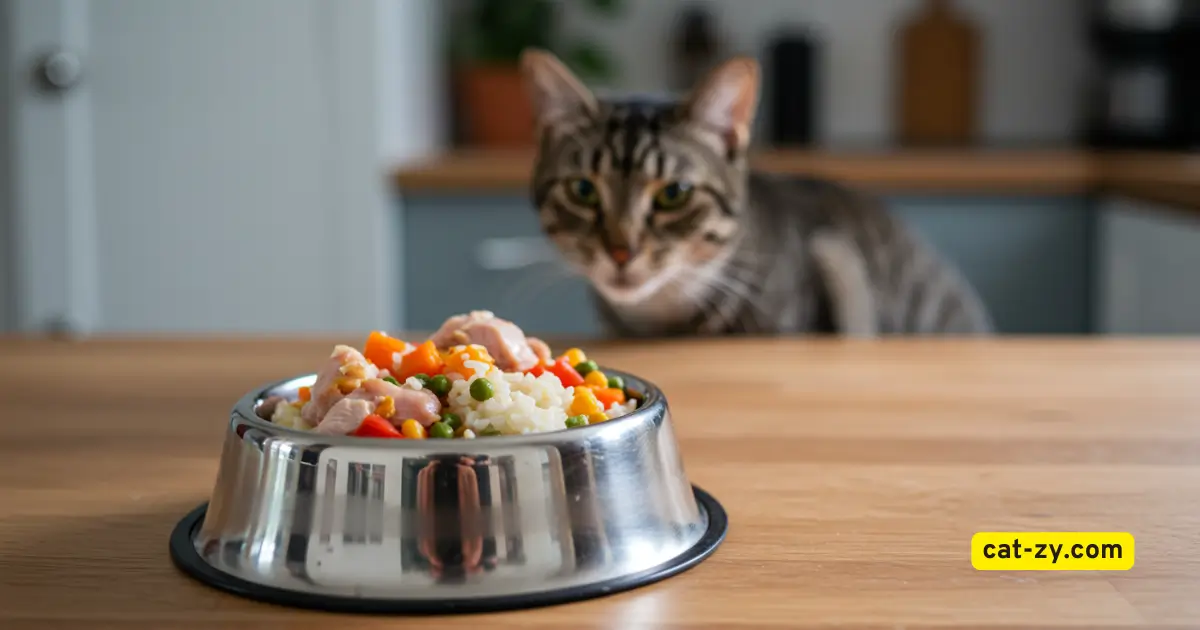
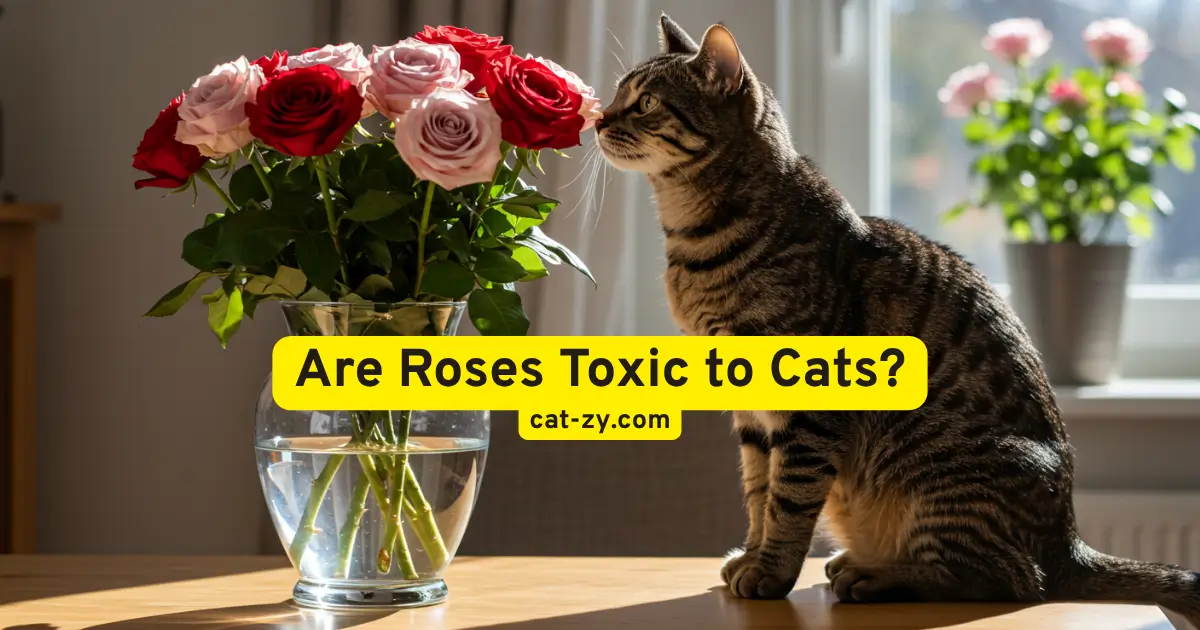


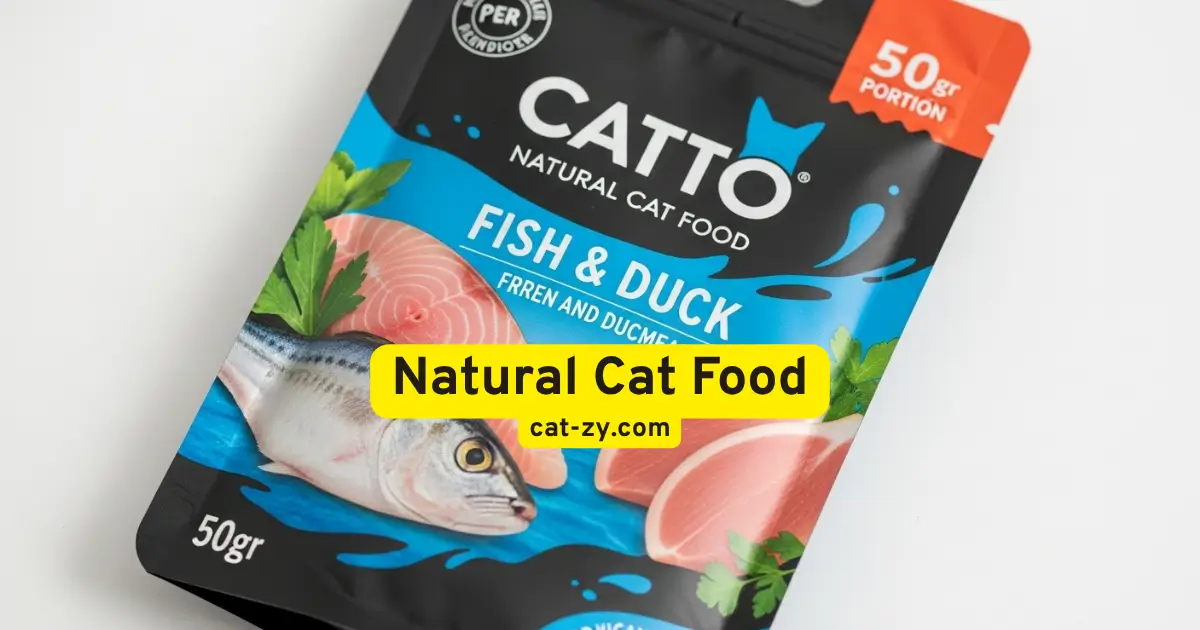
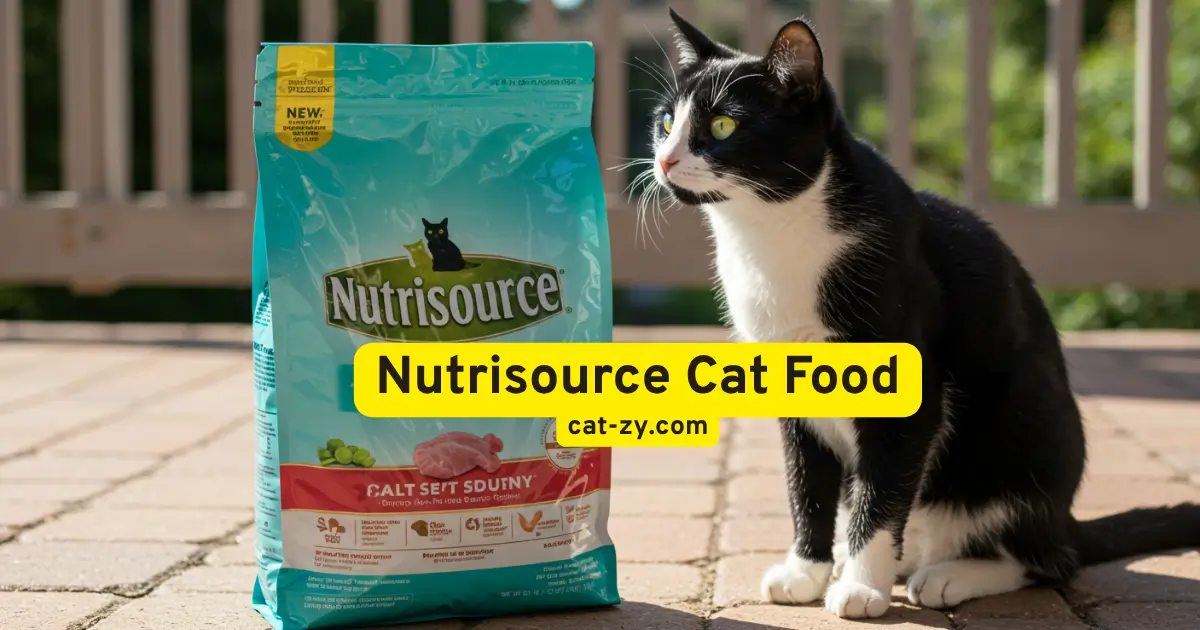
One Comment
Comments are closed.